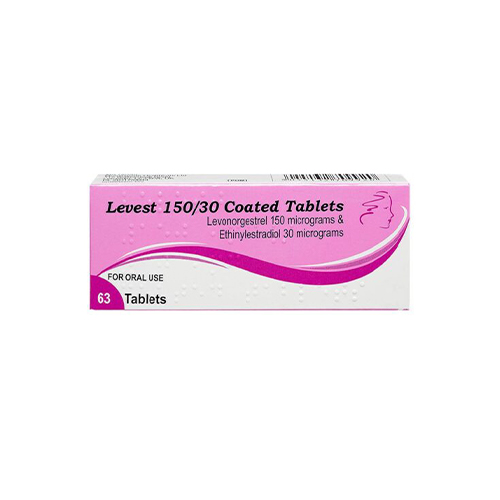- Effective (Up to 99%)
- Combined contraceptive pill
- Can help period pains
Levest
Levest is a combined oral contraceptive pill used to prevent pregnancy. Levest is a 21-day Pill – you take one each day for 21 days, followed by 7 days when you take no pills.
What is Levest?
Levest coated tablets are a combined oral contraceptive and belong to a group of products often referred to as “the Pill”.
Levest contains two hormones: oestrogen (Ethinylestradiol) and progestogen (Levonorgestrel).
These hormones prevent you from getting pregnant, just as your natural hormones would prevent you from conceiving again when you are already pregnant.
Levest, like other hormonal contraceptives, does not protect against HIV infection (AIDS) or any other sexually transmitted disease.
How to take Levest
Take one tablet of Levest every day, if necessary with a small amount of water.
You should take the tablets every day around the same time.
The strip contains 21 tablets. Next to each tablet is printed the day of the week that it should be taken. If, for example, you start on a Wednesday, take a tablet with “WED” next to it. Follow the direction of the arrow on the strip until all 21 tablets have been taken.
Then take no tablets for 7 days. In the course of these 7 tablet-free days (otherwise called a stop or gap week) bleeding should begin. This so-called “withdrawal bleeding” usually starts on the 2nd or 3rd day of the gap week.
On the 8th day after the last Levest tablet (that is, after the 7-day gap week), start the following strip, even if the bleeding has not stopped. This means that you should start the following strip on the same day of the week and that the withdrawal bleed should occur on the same days each month.
If you take Levest in this manner, you are also protected against pregnancy during the 7 days that you are not taking a tablet.
If you take more Levest than you should
There are no reports of serious harmful results of taking too many Levest tablets.
If you take several tablets at once then you may have symptoms of nausea or vomiting. Young girls may have bleeding from the vagina. If you have taken too many Levest tablets, or you discover that a child has taken some, ask your doctor or pharmacist for advice.
If you forget to take Levest
If you are less than 12 hours late in taking your pill, the protection from pregnancy is not reduced. Take the tablet as soon as you remember, and then continue to take following pills at the usual time (even if this means taking two tablets the same day). In this case you do not need to use any additional method of contraception.
If you are more than 12 hours late taking a tablet, the protection from pregnancy may be reduced. The greater the number of tablets that you have forgotten, the greater is the risk that the protection from pregnancy is reduced.
The risk of incomplete protection against pregnancy is greatest if you forget a tablet at the beginning or the end of the strip.
If you are not sure how to proceed, contact your doctor for advice.
If you want to stop taking Levest
You can stop taking Levest whenever you want. If you do not want to become pregnant, ask your doctor for advice about other reliable methods of birth control. If you want to become pregnant, stop taking Levest and wait for a menstrual period before trying to become pregnant. You will be able to calculate the expected delivery date more easily.
If you have any further questions on the use of this medicine, ask your doctor or pharmacist.
Levest precautions
Do not take Levest
If you are allergic to ethinylestradiol or levonorgestrel or any of the other ingredients of this medicine
If you have (or have ever had) a blood clot in a blood vessel of the leg (thrombosis), lung (pulmonary embolism) or other organs.
If you have (or have ever had) a heart attack or stroke.
If you have (or have ever had) a disease that can be a predictor of a heart attack (for example, angina pectoris, which causes severe pain in the chest) or of a stroke (for example, a transient slight stroke with no residual effects).
If you have a disease that may increase the risk of thrombosis in the arteries. This applies to the following diseases:
- Diabetes mellitus with damaged blood vessels.
- Very high blood pressure.
- A very high level of fat in the blood (cholesterol or triglycerides).
If you have a disturbance of blood clotting (for example, protein C deficiency).
If you have (or have ever had) a certain form of migraine (with so-called focal neurological symptoms).
If you have (or have ever had) liver disease and your liver function are still not normal.
If you have (or have ever had) a tumour in the liver.
If you have (or have ever had) or if you are suspected of having breast cancer or cancer of the genital organs.
If you have any unexplained bleeding from the vagina.
If you have hepatitis C and are taking the medicinal products containing ombitasvir/paritaprevir/ritonavir and dasabuvir
Talk to your doctor or pharmacist before taking Levest.
Levest and blood clots (thrombosis)
Venous blood clots
The use of any combination pill, including Levest increases a woman’s risk of developing a blood clot or thrombosis (formation of a blood clot in vessels) compared with a woman who does not take any (contraceptive) pill.
The risk of venous thrombosis in users of combined pills increases:
- With increasing age.
- If you are overweight.
- If one of your close relatives has had a blood clot (thrombosis) in the leg, lung, or other organ at a young age.
- If you must have an operation (surgery), any prolonged period of immobilisation, or if you have had a serious accident. It is important to tell your doctor in advance that you are using Levest as the treatment may have to be stopped. Your doctor will tell you when to start again. This is usually about two weeks after you are back on your feet.
Possible interactions with other medications and Levest
Some medicines can make Levest less effective in preventing pregnancy or can cause unexpected bleeding.
They include medicines used for the treatment of:
- epilepsy (e.g. primidone, phenytoin, barbiturates, carbamazepine, oxcarbazepine, topiramate and felbamate),
- tuberculosis (e.g. rifampicin),
- HIV infections (ritonavir, nevirapine) or other infectious diseases (griseofulvin),
- High blood pressure in the blood vessels in the lungs (bosentan),
- the herbal remedy St. John’s wort.
Levest may influence the effect of other medicines, for example:
- medicines containing cyclosporin,
- the anti-epileptic lamotrigine (this could lead to an increased frequency of seizures).
Your doctor will prescribe another type of contraceptive prior to the start of the treatment with these medicinal products.
Levest can be restarted approximately 2 weeks after completion of this treatment.
See section “Do not take Levest”
Levest side effects
What are the side effects of Levest?
The most common side effect from Levest is nausea. You may also get:
- Diarrhoea
- Vomiting
- Headache
- Bloating or stomach pain
- Abdominal cramps
- Constipation
- Dizziness
- Feeling tired or weak
- Fluid retention
Less common:
- Deep vein thrombosis
- heavy periods
- Breast pain
Very rare side effects:
- Breast cancer
This list is not exhaustive please refer to the patient information leaflet (PIL) or speak to your health care professional.
Levest and other medications
Interaction with other drugs
Antiepileptic medicines: carbamazepine, oxcarbazepine, perampanel, phenobarbital, primidone, phenytoin or topiramateHIV treatment: cobicistat, efavirenz, nevirapine or ritonavir
Antifungal: griseofulvin
modafinil for narcolepsy
Antibiotics: rifabutin or rifampicin for tuberculosis
Levest and herbal supplements
St John's wort: Can make Levest less effective, your doctor will should recommend that you temporarily use a different form of contraception.
While you're taking Levest it's always recommended that you check with your doctor before you take any other new medicines.
What if I get pregnant while taking Levest?
It's highly unlikely that you will get pregnant if you are taking Levest correctly as prescribed by your doctor. If in the exceptional circumstance this does happen, we have not identified any literature evidence suggesting Levest or any contraceptives will be harmful to the baby.
Can I take Levest if I'm breastfeeding?
Levest pills are not the preferred method of contraception for women who are breastfeeding. Oestrogen can reduce lactation (breast milk). The mini pill is a good alternative.
How to buy Levest
You can buy Levest online from AccessDoctor even if this is your first time using the pill.
Where to get further advice
You can get advice from:
- a contraception (family planning) clinic
- an NHS walk-in centre
- NHS 111 FPA
- a GP
- a pharmacist




We’re here to help.
Our friendly team is available to help Monday to Friday 9:00am - 5:00pm.
If you need urgent assistance, do not use this service. Call 111, or in an emergency call 999.

